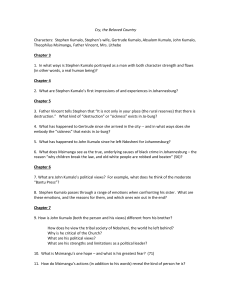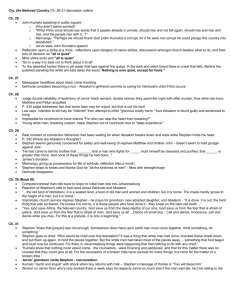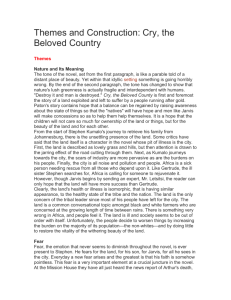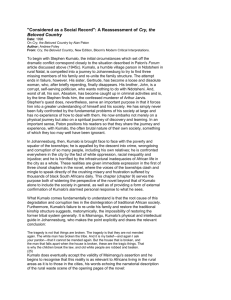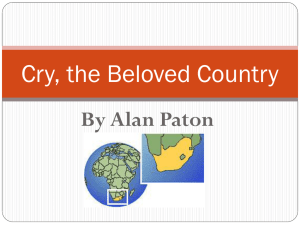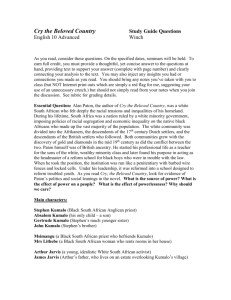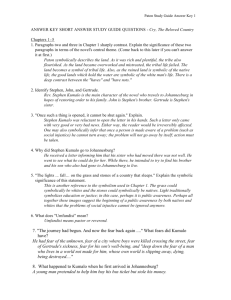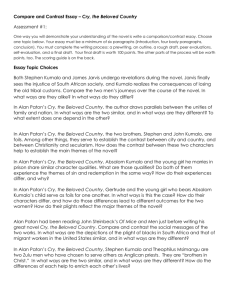Study questions for Cry, the Beloved Country
advertisement
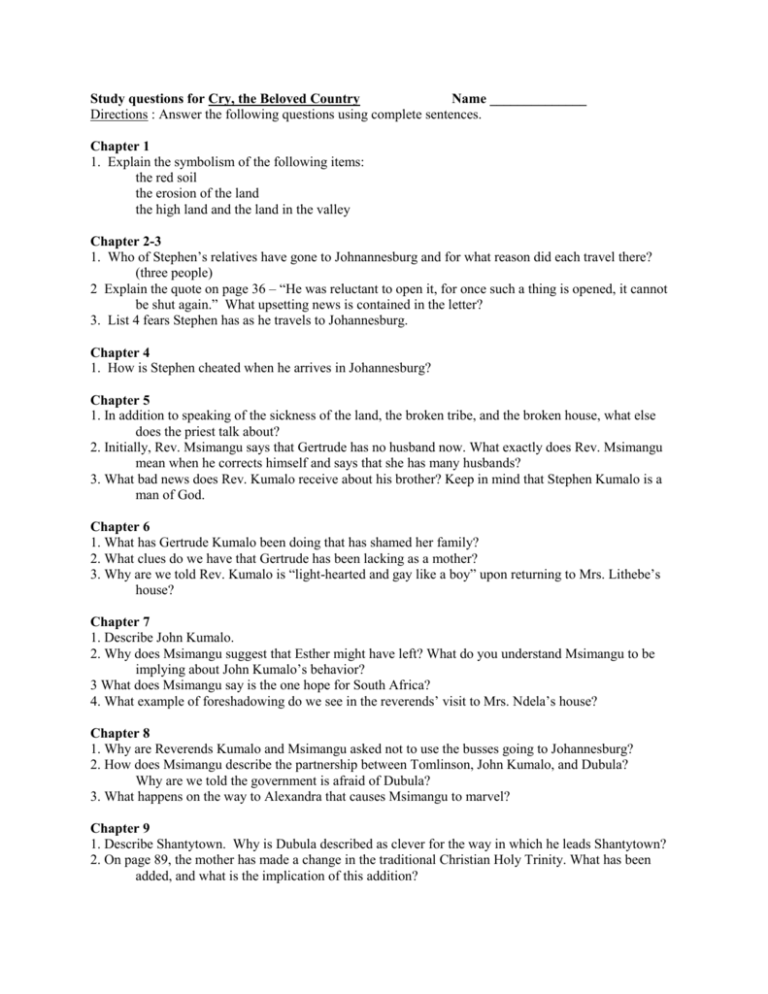
Study questions for Cry, the Beloved Country Name ______________ Directions : Answer the following questions using complete sentences. Chapter 1 1. Explain the symbolism of the following items: the red soil the erosion of the land the high land and the land in the valley Chapter 2-3 1. Who of Stephen’s relatives have gone to Johnannesburg and for what reason did each travel there? (three people) 2 Explain the quote on page 36 – “He was reluctant to open it, for once such a thing is opened, it cannot be shut again.” What upsetting news is contained in the letter? 3. List 4 fears Stephen has as he travels to Johannesburg. Chapter 4 1. How is Stephen cheated when he arrives in Johannesburg? Chapter 5 1. In addition to speaking of the sickness of the land, the broken tribe, and the broken house, what else does the priest talk about? 2. Initially, Rev. Msimangu says that Gertrude has no husband now. What exactly does Rev. Msimangu mean when he corrects himself and says that she has many husbands? 3. What bad news does Rev. Kumalo receive about his brother? Keep in mind that Stephen Kumalo is a man of God. Chapter 6 1. What has Gertrude Kumalo been doing that has shamed her family? 2. What clues do we have that Gertrude has been lacking as a mother? 3. Why are we told Rev. Kumalo is “light-hearted and gay like a boy” upon returning to Mrs. Lithebe’s house? Chapter 7 1. Describe John Kumalo. 2. Why does Msimangu suggest that Esther might have left? What do you understand Msimangu to be implying about John Kumalo’s behavior? 3 What does Msimangu say is the one hope for South Africa? 4. What example of foreshadowing do we see in the reverends’ visit to Mrs. Ndela’s house? Chapter 8 1. Why are Reverends Kumalo and Msimangu asked not to use the busses going to Johannesburg? 2. How does Msimangu describe the partnership between Tomlinson, John Kumalo, and Dubula? Why are we told the government is afraid of Dubula? 3. What happens on the way to Alexandra that causes Msimangu to marvel? Chapter 9 1. Describe Shantytown. Why is Dubula described as clever for the way in which he leads Shantytown? 2. On page 89, the mother has made a change in the traditional Christian Holy Trinity. What has been added, and what is the implication of this addition? Chapter 10 1. Who tells the reverends that Absalom has been sent somewhere? Where has he been sent? 2. What is Rev. Kumalo referring to when he says he remembers when Rev. Msimangu “first became afraid”? 3. How is Absalom Kumalo regarded at the reformatory? What does the staff think about Absalom and his future? 4. What does Paton tell us about the tone of the young woman from Pimville? Chapter 11 1. What news do the reverends receive from the Evening Star? 2. What is Rev. Kumalo’s connection to the Jarvis family? 3. What was Arthur Jarvis writing about at the time of his death? 4. Given Jarvis’ efforts in the African community and the manuscript he was writing, how is the death of Arthur Jarvis both tragic and ironic? 5. What and who are we told to cry for at the end of chapter 11? Chapter 12 1. Why should the unborn child not love, laugh, or give too deeply? What is Paton referring to when he writes of “the unborn child”? 2. In addition to the reverends, who else is vigorously looking for Absalom Kumalo? Chapter 13 1. What has Rev. Kumalo already begun to fear? 2. Besides education, what does Rev. Kumalo hope the schools in Ndotsheni will provide? 3. While sitting in the place of ashes, what does Rev. Kumalo finally admit to himself? 4. When Paton tells us that Rev. Kumalo knows what blind man Rev. Msimangu is preaching to, who is it? Chapter 14 1. Who fired the shot that killed Arthur Jarvis? Who else was involved in the incident? 2. What biblical story does John Kumalo mock and what moral idea does John Kumalo mock? 3. Why does the book say the murder of a white man is more shocking than murder by itself? Chapter 15 1. What are the two reasons for which Father Vincent says it is important to get a lawyer? 2. How does Rev. Kumalo compare himself to the sleeping man in the grass who is lying in the path of an oncoming storm? 3. Why does Father Vincent say sorrow is better that fear? 4. Why does Rev. Kumalo take issue with his son Absalom’s tears? Chapter 16 1. What happened to the young girl from Pimville’s first two husbands? 2. What is the promise that Rev. Kumalo asks the girl from Pimville to make? Chapter 17 1. What are Mrs. Lithebe’s two complaints about Gertrude? 2. How are we told that the girl from Pimville is unlike Gertrude? 3. What does it mean when it is said that Mr. Carmichael will be taking Absalom’s case “pro deo”? Chapter 18 1. What division does there seem to be between the whites in South Africa? Chapter 19 1. Over what topic did James Jarvis not see eye to eye with his son? 2. What languages are we told Arthur Jarvis spoke? What does this say about him? 3. Whom did Arthur Jarvis blame for native crime? 4. What does James Jarvis remember about the mission back home in Ndotsheni? Chapter 20 1. According to Arthur Jarvis, what is the duty of the white civilization in South Africa? 2. What men exercised much influence over Arthur Jarvis? Chapter 21 1. What things did James Jarvis experience for the first time at his son’s funeral? 2. What justifications does Mr. Harrison offer for not allowing the native miners to go on strike? 3. What arguments for apartheid does Arthur Jarvis’ manuscript list? Chapter 22 1. What argument does Paton make when he says, “The Judge does not make the Law. It is the People that make the Law.”? ( pg 191) 2.What answer does Absalom give when he is asked WHY he carried a revolver? Chapter 23 1. What distracts Johannesburg from the trial of Arthur Jarvis? 2. What statement does Paton seem to be making when he says that the Afrikaans names of the mines are unpronounceable? Who seems to be speaking in these paragraphs? Chapter 24 1. What does Arthur Jarvis mean when he says (in his writing) that he never learned of South Africa from his parents? 2. Is the policeman’s reason for why James Jarvis left by the front door correct or incorrect? Why? Chapter 25 1. Why is Kumalo so shaken when he visits Barbara Smith’s house? 2. Describe the conversation between Kumalo and James Jarvis. Chapter 26 1. What is Dubula’s & Tomlinson’s response to John Kumalo’s speech? 2. What does John Kumalo say the people are asking for? Do you agree or disagree with his point? Chapter 27 1. Why does Mrs. Lithebe scold Gertrude? What does Paton mean when he says the term “talk carelessly”? 2. What does Mrs. Lithebe and Msimangu hide from Kumalo? Chapter 28 1. What decision does the Judge make about Matthew Kumalo and Johannes Pafuri? What reasons does he give to support this decision? 2. How does Paton address the issue of a judge ruling on an unjust law? 3. What sentence does Absalom receive? 4. What custom is broken as the people exit the courtroom? Chapter 29 1. Does Absalom seem remorseful about his crime as he says goodbye to his father? 2. What gift does James Jarvis give John Harrison? 3. What gift does Msimangu give Kumalo? 4. What decision does Gertrude make? Chapter 30 1. How does the village respond to Kumalo’s return? Chapter 31 1. What language is Jarvis’ grandson trying to learn? Why is this significant? 2. What are the children in Ndotsheni lacking? How is it supplied? Chapter 32 1. Describe the symbolism behind the thunderstorm coming to the valley. 2. What change is happening in James Jarvis? Chapter 33 1. List the different things that offer the umfundisi hope in this chapter. Chapter 34 1. What changes the Bishop’s mind about asking Kumalo to leave Ndotsheni? Chapter 35 1. Describe the young man’s politics. Why would Kumalo caution the young man that his politics are dangerous? Chapter 36 1. Explain the symbolism of the coming dawn. 2. Why do you think Paton chose to end his book like this?
